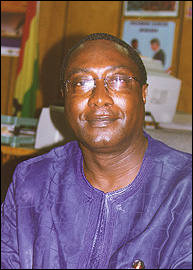 Tourism
Boom Tourism
Boom
Faced with dwindling foreign exchange earnings from its major export commodities, gold and cocoa, the prices of which continue to drop on the world market, Ghana has wisely diversified by focusing its attention on the tourism sector. From an insignificant position, government envisages that tourism will become the number one foreign exchange earner for the country. To achieve this aim, a 14-year development plan has been programmed to cover four major tourism areas; the historical, cultural, eco-tourism and leisure tourism. "When you look at all these areas you will realize we have tremendous potential so when attention was focused on them tourist arrivals increased remarkably" says Mike Gizo , Minister of Tourism
Basically tourism has been private-sector led, but the government has played a part in providing infrastructure, roads utilities, electricity and water for the sector. Efforts are being concentrated at Cape-Coast, the hub of old castles and forts, Ashanti cultural tourism and the Kakum National Park which has been a tremendous success because it boasts of the only canopy walk-way in the whole of West Africa. The Minister of Tourism, Mr. Mike Gizo, insists that political stability, security and safety account for the increase in foreign arrivals which currently stands at 340,000 per year.
The tourism sector however has faced constraints, particularly the inadequate hotel accommodation especially in the capital - Accra. The government, recognizing the effect it would have on the growth of the sector, has instituted a program including incentives to increase accommodation facilities. For instance, a corporate tax rebate of 25 per cent is given for facilities sited in Accra, and all others outside the capital attract 50 per cent rebate. This includes a waiver of custom duty on items meant for the tourism facilities.
Mrs. Owusu-Fianko , the Chief Executive of the Ghana Tourist Board , says that by the end of the year, there will be another five star deluxe hotel offering about 250 rooms. "We are expecting the Inter-Continental to be here, Sheraton is also coming and another five star hotel but we are not sure of who is going to handle it. By the year 2001 we should boast of a total of four 5 star accommodation of over nearly 3000 rooms." | 
Ghana currently has two 4 star international hotels, the Golden Tulip and the Labadi Beach Hotel. There is also the Novotel Hotel which is a 3-star. A new five star hotel, the La Palm Royal Beach Hotel with 400 rooms including 15 presidential suites and under the management of Ceasarís Palace of Las Vegas, has recently been commissioned.
The 234 rooms Golden Tulip Hotel owned by the Ghana government and the Ghana-Libyan Arab Holding Company is the leading hotel with a market share of 49 per cent as compared to the Labadi Beach and the Novotel. With an annual turn over of about 13 million dollars. The potential in the industry has immense benefits for the country. By the year 2001 there will be three new five-star hotels in Accra and that will increase competition but Golden Tulip believes it can still top the field. "Our strategy is very simple, we have to emphasize more on the service, standards and cleanliness because that really makes the difference between a good hotel and a bad one," says Thomas C. Sheriff , General Manager of the Golden Tulip Hotel. |

